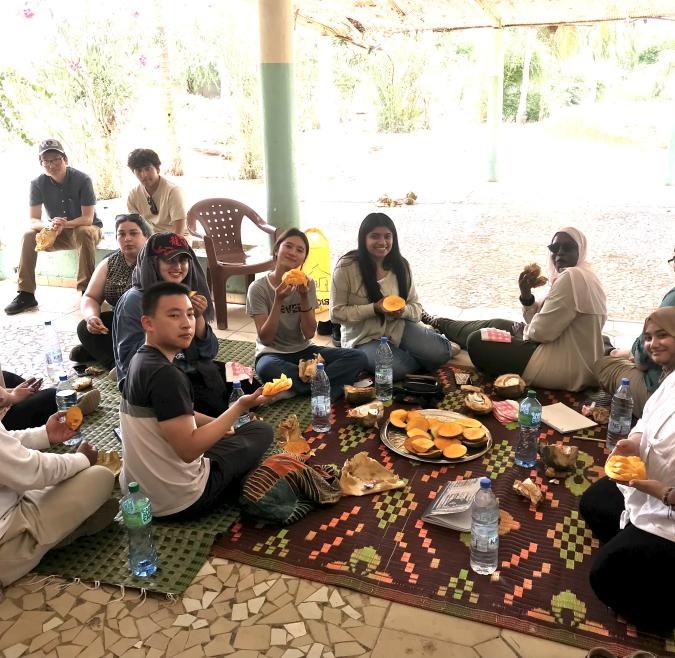Summer: Rutgers- Public Health, Environment, and Development in Senegal
The Program
The course focuses on a neglected tropical disease, schistosomiasis, to explore the causes of rising cases and the social, cultural, ecological, and economic challenges to reducing the disease burden in Northern Senegal.
Program Locations

Senegal
Saint Louis
This two-week course explores challenges of addressing public health problems in acutely poor regions, such as rural Senegal, where people have limited access to health clinics, medical information, and effective treatments. Focusing on the case study of schistosomiasis, an acute, chronic disease with global reach, students will learn the socio-cultural context of schistosomiasis infection and the challenges of easing the disease burden in North Senegal. Our home base is in the historic city center of Saint Louis, known for its fishing economy and French colonial architecture. The course will especially interest majors in the health fields, anthropology, environmental studies, French, and African Studies
Academics
This two-week study abroad course explores challenges of addressing public health problems in acutely poor regions, such as rural Senegal, where people have limited access to health clinics and effective treatments. Focusing on the case study of schistosomiasis, a neglected tropical disease with global reach, students will learn the specific challenges of easing the burden of schistosomiasis in North Senegal. We will examine the political and ecological transformations around the Senegal River that have led to a rise in the disease and discover scientists’ efforts to find solutions. We will examine the local healthcare infrastructure around Saint Louis, including state clinics and traditional healers. Students will employ methods of medical anthropology, including ethnographic interviews and participant observation, to inquire into people’s explanatory models of schistosomiasis and gender- and age-based risk factors. In addition, we will study the scientists, learning their explanatory models of disease transmission, and observing and participating in their methods of data collection and analysis. The program includes cultural training, field trips, biomass removal and snail collection from the Senegal River, laboratory work, village visits, and collaboration with students from Gaston Berger University. The course will especially interest majors in the health fields, anthropology, and environmental studies, as well as minors in African Studies. (The course also counts as an elective for the Undergraduate Public Health Program.)
Watch a video created by the students who traveled to Senegal in 2021. https://vimeo.com/767412655/fdc24428e3
Housing and Meals
We will be staying at a beachside hotel with a swimming pool located a few miles from the old city of Saint Louis. Students will share bungalows. Breakfast and lunch are included in the program fee, but students are responsible for their own dinner. The hotel has a restaurant, and the old city of Saint Louis has a variety of Senegalese and European-style restaurants, art galleries, murals, a post office, horse-drawn carriage tours, the French cultural center, and residences.
Vaccines: You must show proof of an updated COVID-19 vaccination by phone app or your official government-issued card (bringing your vaccination card is recommended in case of poor WiFi in the airport). Yellow Fever vaccination and malaria prophylaxis are also required for this program and can be acquired at a Travel Clinic in New Jersey.
Visit the Embassy of Senegal website for the most current visa information. Evidence of yellow-fever vaccination is required for entry into Senegal for travelers arriving from yellow-fever endemic countries.
Financial Information
Program Costs
| NJ Resident | non-NJ Resident | |
|---|---|---|
| Before Scholarship undergrad cost | $3,180 | $3,280 |
| Before Scholarship grad cost | $3,240 | $3,340 |
| Scholarship Funded undergrad cost | $680 | $780 |
| Scholarship Funded grad cost | $740 | $840 |
Program Cost includes:
- Tuition
- Housing
- Some meals
- Excursions
- Administrative Fees
- Emergency Medical Access Abroad
- (All 2023 students will be billed the amount with Scholarship thanks to the MadRose Foundation)
Out-of-Pocket Costs
| Airfare | Subsidized by MadRose Foundation |
| Meals | $175 |
| Yellow Fever Vaccine Required | $200 |
| Malaria prophylaxis | $40 |
| Personal Expenses | $100 |
| Total | $515.00 |
Out-of-Pocket Cost includes:
The above costs are estimations and represent the known out-of-pocket costs students encounter during their time abroad.
Some of these expenses will be paid for prior to going abroad, such as an airline ticket, while some of these expenses, such as meals and personal expenses, will be paid in-country as part of your daily expenses. As you plan, you will need to budget these costs and spend wisely throughout your time abroad.

